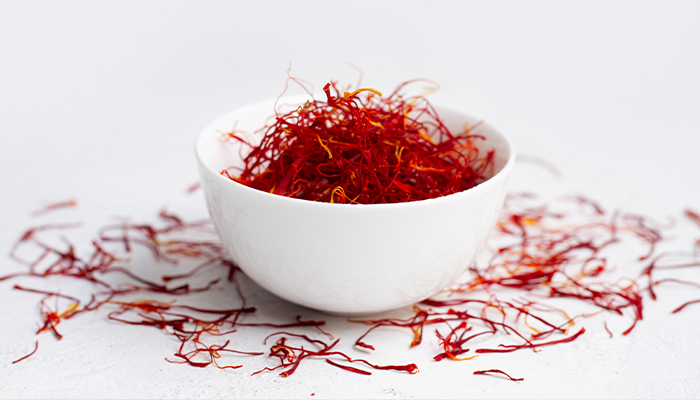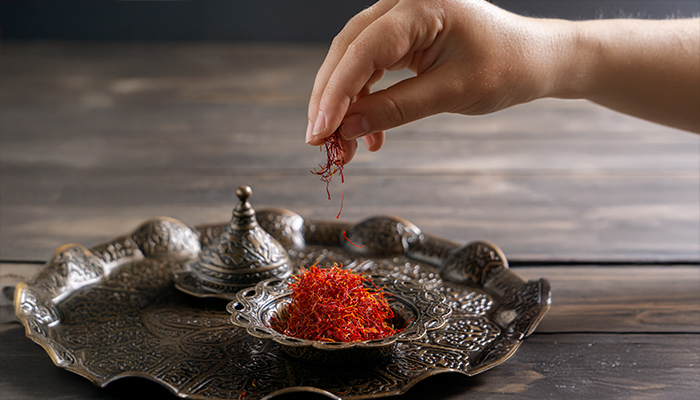Saffron, often referred to as the "golden spice," is not only prized for its rich flavour and vibrant hue but also for its impressive array of health benefits. Derived from the Crocus sativus flower, saffron has been utilised for centuries in culinary and medicinal practices. Modern research continues to uncover its potential therapeutic properties. However, like any potent substance, it's essential to be aware of its side effects and use it judiciously.
Key Takeaways
- Mood Enhancement: Saffron's bioactive compounds, crocin and safranal, have been linked to improved mood and reduced symptoms of mild depression and anxiety.
- Antioxidant Properties: Rich in carotenoids and polyphenols, saffron helps neutralise free radicals, reducing oxidative stress and inflammation.
- Skin Health: Saffron's anti-inflammatory and antioxidant properties contribute to a healthy complexion and may aid in treating skin conditions.
- Weight Management: Some studies suggest saffron may help control appetite and reduce snacking, potentially assisting in weight loss.
- Cognitive Support: Preliminary research indicates saffron may improve memory and learning abilities, with potential applications in conditions like Alzheimer's disease.
- Heart Health: Saffron's antioxidants may support healthy cholesterol levels and improve circulation, contributing to cardiovascular health.
- Potential Side Effects: While generally safe in culinary amounts, excessive intake can lead to nausea, dizziness, or stomach upset. Pregnant women should avoid medicinal amounts due to potential uterine contractions.
1. Supports Mood and Mental Wellbeing

Saffron's mood-enhancing properties have garnered significant attention. Bioactive compounds like crocin and safranal are associated with improved mood and reduced symptoms of mild depression and anxiety. A study published in the Journal of Clinical Psychopharmacology found that saffron supplementation was as effective as conventional antidepressants in treating mild to moderate depression.
2. Provides Antioxidant Protection
Saffron is rich in carotenoids and polyphenols, which help neutralise free radicals, reduce inflammation, and protect cells from oxidative damage. These antioxidants play a crucial role in combating oxidative stress, which is linked to various chronic diseases.
3. Eases PMS Symptoms
Premenstrual syndrome (PMS) can cause a range of symptoms, including mood swings, irritability, and cramps. Studies show saffron may help alleviate these issues while also supporting menstrual cycle regulation. A study published in Phytotherapy Research found that saffron supplementation significantly reduced PMS symptoms in women.
4. Promotes Heart Health
Antioxidants in saffron may support healthy cholesterol levels, improve circulation, and protect blood vessels, contributing to cardiovascular health. A review in Phytotherapy Research highlighted saffron's potential in reducing blood pressure and improving lipid profiles.
5. Supports Cognitive Function

Early research suggests saffron may improve memory and learning ability, with potential applications in conditions like Alzheimer's disease. A study published in Psychopharmacology found that saffron supplementation improved cognitive function in patients with mild to moderate Alzheimer's disease.
6. Protects Eye Health
Saffron supplementation has been linked with improved visual function in age-related macular degeneration due to its carotenoid content. A study in Ophthalmic Research found that saffron improved visual acuity and contrast sensitivity in patients with early age-related macular degeneration.
7. Helps Control Appetite
Some studies indicate saffron extract may reduce cravings and unplanned snacking, aiding weight management when combined with a healthy lifestyle. A study published in Appetite found that saffron supplementation reduced snacking frequency and body weight in overweight women.
Possible Side Effects of Saffron

While saffron is generally safe in culinary amounts, excessive intake can cause nausea, dizziness, or stomach upset. Very high doses (over 5 g/day) can be toxic. Pregnant women should avoid medicinal amounts of saffron it may trigger uterine contractions. Adulteration is common due to its high cost, so sourcing from reliable suppliers is crucial.
Personal Experience
Having incorporated saffron into my daily routine, I've noticed subtle yet significant improvements in my mood and energy levels. A warm cup of saffron-infused milk in the evening has become a soothing ritual, helping me unwind and sleep better. While the benefits are gradual, the overall sense of well-being is undeniable.
Conclusion
Saffron, with its rich history and array of health benefits, is more than just a culinary delight. From enhancing mood and cognitive function to promoting heart and eye health, its potential is vast. However, like any potent substance, it's essential to use saffron judiciously and source it from reliable suppliers to reap its benefits safely.


I’m Kanak Mahur, a Nutrition Consultant with a Master’s in Dietetics and Food Service Management. With 2+ years of experience in clinical nutrition, I create evidence-based plans tailored to individual needs, medical histories, and lifestyles. My focus is on sustainable, goal-oriented strategies that empower people to make informed choices and build lasting, healthy habits.
How can I incorporate saffron into my diet?
Saffron can be added to dishes like biryani, soups, and teas. Soaking a few strands in warm water or milk before use enhances their flavour and potency.
Is saffron safe during pregnancy?
It's advisable to consult a healthcare provider before using saffron in medicinal amounts during pregnancy, as it may trigger uterine contractions.
Can saffron be used topically for skin benefits?
Yes, saffron can be used in face packs or mixed with rose water to treat acne and promote a healthy glow. However, perform a patch test first to ensure no allergic reactions.
Where can I buy pure saffron?
To ensure purity, purchase saffron from reputable suppliers. Look for certifications and opt for saffron that is deep red with minimal yellow or white parts.


